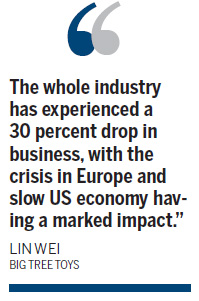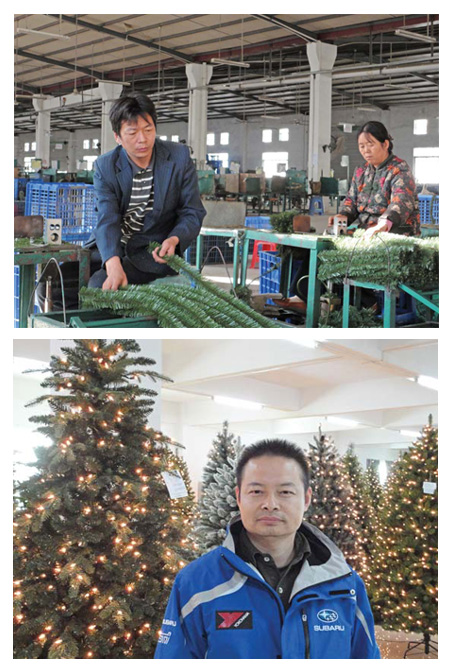A Christmas chill
Updated: 2011-12-16 08:57
By Alexis Hooi and Qiu Quanlin (China Daily)
|
|||||||||


Chinese manufacturers in the 'factory of the world' reliant on the festive buying season search for new ways to ward off economic woes in the West
Peng Hua watches over two of his factory workers as they string up a bunch of plastic pine needles on a wire before twirling them into a branch in a largely empty warehouse.
It is the beginning of December in the outskirts of the southern Chinese city of Shenzhen and the air is a comfortable 20 C, but the 41-year-old general manager of King Tree Handicrafts Company, a leading Christmas tree maker in the manufacturing hub, is starting to feel the chill of winter in the West.
"We are already experiencing the effects of the economic crisis. Things are probably going to worsen for our industry," Peng says.
King Tree is one of about 200 businesses in the area that help the country churn out 90 percent of the plastic Christmas trees used worldwide, Peng says. His company started making the trees in the late 1980s and rakes in about $20 million (15 million euros) a year. The US market makes up about 70 percent of the festive demand for its trees, with European buyers taking up most of the rest, he says.
| ||||
Peng says that amid this year's bleak global economy, demand is expected to decrease and quite a few smaller businesses have already folded. Still, orders have not plunged as many would expect even though major customers in the West already seem to be "downsizing" to simpler and cheaper products.
"A family that bought a tree with all the trimmings might now look for one without those for half the price," Peng says. "Many are also going for cheaper do-it-yourself products."
The full brunt of the slow US economy and Europe's debt crisis can only be felt when orders for next year's trees are received in the coming months, he says, but King Tree is bracing for lower profit margins.
"We were slowly recovering from the 2008 global financial crisis when business fell by up to 30 percent. But now, with the latest economic woes, we might see lesser growth of about 15 percent. That space is getting smaller and smaller," he says.
"Like many other industries here in Shenzhen, we also have to deal with other economic challenges like the rising cost of labor and raw materials."
Shenzhen has grown to become one of China's richest cities since it became a special economic zone in 1980 following the country's reform and opening-up. The city is located in Guangdong province's Pearl River Delta (PRD) region, a main engine of China's economic development fueled by low-cost manufacturing and export-oriented industries including textiles and electronics, mostly with initial investment from neighboring Hong Kong, that help make the province churn out one-quarter of the country's exports.
Last year, Guangdong's GDP ranked first in the country, with key cities like Shenzhen and provincial capital Guangzhou recording GDP growth ranging from 10 percent to 12 percent, industry figures show.
Chinese exports continue to increase year-on-year, but they are doing so at the slowest pace since December 2009, figures from the General Administration of Customs show. Exports increased almost 16 percent year-on-year to more than $157 billion in October but that was the slowest growth in eight months. The total figure actually dropped from September's $169.7 billion, amid economic problems in the US and Europe. China's manufacturing activity also contracted last month for the first time in 33 months, latest available figures show.
Guangdong itself is expecting the worst in foreign trade in the first half of next year, Zheng Jianrong, deputy director of the provincial foreign and economic department, recently said.
Similarly, currency appreciation and rising costs are squeezing the profits of many Chinese exporters. The yuan has gained about 10 percent against the US dollar since China ended a two-year peg to the dollar in June last year.
Labor, one of the main factors behind economic success in the PRD, is also threatening development in an area known for its inexpensive workforce. Many areas in the PRD are raising minimum wages along with rising inflation and labor shortages, as workers are less drawn to work in the region compared to their home provinces where the cost of living is lower.
By the end of September, 21 local governments nationwide had raised the minimum wage by an average of 21.7 percent, the Ministry of Human Resources and Social Security reported.
Earlier this year, Shenzhen authorities said they would raise the minimum wage by 20 percent to 1,320 yuan ($200, 150 euros) a month - the highest in the country. There are now plans to increase that to 1,500 yuan a month next year. Wages in many areas in the PRD have risen more than 30 percent with pay for ordinary workers averaging nearly 3,000 yuan a month. King Tree's Peng says he expects his wages to continue rising.
"For the West, Christmas trees are a necessity during this time of the year. So mid-sized businesses like us will always be able to survive, in one way or another. But the smaller players and the ones that make the ornaments and the decorations, already hit by rising costs, might feel any cutback in Christmas buying more severely," he says.
Wu Yaqin, secretary-general of Shenzhen's handicrafts and gifts industry association, says many manufacturers in the area that are struggling to stay afloat amid the tightening market are already moving to nearby provinces such as Zhejiang for cheaper labor and costs, in part by outsourcing work to villages.
Chen Guanghan, an economics professor and director of the center for studies of Hong Kong, Macao and the Pearl River Delta at Sun Yat-sen University, says the smaller manufacturers in the PRD will most definitely suffer from decreasing orders for Christmas goods in the West.
"The small players will have no room to maneuver or upgrade and many of these will probably be the casualties of the economic downturn. The bigger players might be able to cope and many low-cost producers are already moving to even cheaper places overseas, such as Vietnam, even as they try to develop new markets away from the US and Europe," Chen says.
Alberto Vettoretti, managing partner of the China and Vietnam practice at Shenzhen-based business advisory Dezan Shira and Associates, says many businesses are "feeling the pressure".
"Many are moving away from the more high-end and sophisticated products for Christmas. The West is still very much thinking twice about spending too much," says Vettoretti, who is also vice-chair of the Pearl River Delta board of the European Union Chamber of Commerce in China.
"In terms of manufacturers with the ability to make cheap products, a lot of them are no longer in Guangdong. Many have moved to areas with more competitive costs and prices like Yiwu in Zhejiang.
"Shenzhen's raising of its minimum wages is also going to affect businesses that already cannot get enough suitable workers."
Zhang Yuge, director of the center for public policy at the Shenzhen-based China Development Institute, says that while the authorities have been making a pronounced push for PRD enterprises to upgrade and move away from its low-cost manufacturing model, it will not be easy to do so in the short term.
"Such manufacturing is certainly not sustainable for the long term. But for the moment, our export-oriented businesses still provide jobs for a large number of workers who would otherwise make much less in the countryside," Zhang says.
"The slow Christmas market has also reiterated how precarious it can be for businesses here to depend too much on exports and the impact of global economic problems at the local level here."
"The rising wages are a very big challenge for us," King Tree's Peng says.
"Our industry usually requires our workers to work overtime, otherwise we will not be able to fill the orders during the peak season. Our wages can be higher than those at other industries here such as electronics."
The Christmas chill from the economic woes of the West are also being felt among many related businesses in Guangdong's Shantou city, a major toy-producing area in China.
Lin Wei, the head of toymaker Big Tree Toys, says the toy industry is in the midst of a downturn, with smaller businesses more severely affected.
"The whole industry has experienced a 30 percent drop in business, with the crisis in Europe and slow US economy having a marked impact," Lin says.
The 40-year-old started Big Tree almost a decade ago and his toy company is now considered one of the largest of its kind in Shantou, involving sectors such as original equipment manufacturing (OEM), trading, supply chain management, sales, designing and branding. It handles about 400,000 types of plastic toys through more than 10,000 toy-related businesses - half of the number operating in the area. Licensed toys it has helped produce include US brand Barbie and Japanese label Hello Kitty.
The company boasts the largest toy showroom in Shantou. It works with more than 8,000 toy manufacturers and represents more than 300,000 toys and entertainment-related products.
Lin, who is also deputy head of the Shantou chamber of commerce, says Chinese factories churn out about 80 percent of the toys made globally. His company, which relies on more than 90 percent of its business in exports, itself reaped 200 million yuan last year and is expected to take in 300 million yuan this year, Lin says.
"Christmas orders traditionally account for 60 percent to 70 percent of our business, and those from major markets in the United States and Europe have dropped significantly, but our new markets in South America, India and Russia have helped to make up for the shortfall," Lin says.
Similar to Guangdong's Christmas tree makers which are scaling back on frills to make their products more affordable for tightened Western purses, Chinese toy companies like Big Tree that have the means to adapt to market realities are also producing less sophisticated and cheaper toys.
The comprehensive and mature supply chain in their production areas mean these companies can quickly source for materials and manufacture new products for foreign buyers with less to spend.
"When an industry faces the crunch, the weaker and smaller players as well as those which cannot meet quality or service standards will leave the field. Those that are able to survive might actually do better as they seek out new markets with enormous potential," Lin says.
"We are now in such markets as Brazil, Mexico, Argentina In Cuba, we do almost all the toys there now."
But Shantou's toymakers are no longer relying too much on exports and staying beholden to the uncertainties of the global economy.
"We are also investing more in the domestic market," Lin says.
"Toy chain stores, for example, are still a relatively new concept for Chinese consumers and we want to build on that through our own brands."
"Again, in terms of quality, Chinese toy products have benefited from the stringent standards of the West in the past few decades and we are now capitalizing on that to expand our reach and market at home," he says.
To that effect, Big Tree has invested in quality and safety testing facilities.
"These are just some of the avenues we must take to move away from being too reliant on exports," Lin says.
"Chinese buyers still consider June 1 (Children's Day) and the summer holidays as well as Spring Festival, as the significant periods for giving toys, not Christmas as it is celebrated in the West. Celebrating Christmas might be more pronounced in the large Chinese cities but it is comparatively absent in the smaller ones."
King Tree's Peng Hua is also spearheading efforts to grow the domestic market for Christmas trees and his company is using its production lull period to move into the furniture and other sectors to diversify its business interests. But he admits his industry will obviously continue to depend heavily on Western markets.
"We started targeting Chinese consumers seriously last year but that brought in only about 3 million yuan for us this year. Most of the trees we sell at home go to hotels and shopping malls that 'celebrate' Christmas, so we bulk up on the designs, lights and decorations for these clients," Peng says.
"Christmas is still very much a Western thing and our trees will depend on foreign consumers for a long time to come."
Chen Hong contributed to this story.
|
Above: Workers at the King Tree Handicrafts Company's factory in Shenzhen. Below: Peng Hua, general manager of King Tree Handicrafts Company, says that the company has felt the chill of the economic crisis. Alexis Hooi / China Daily |
|
Lin Wei, head of toymaker Big Tree Toys in Shantou, Guangdong, says the toy industry has experienced a 30 percent drop, affected by the crisis in the EU and the US. Qiu Quanlin / China Daily |

















